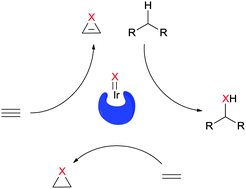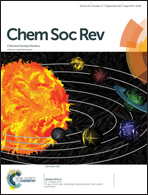Ir-Catalyzed enantioselective group transfer reactions
Abstract
Recently, several novel iridium complexes have been shown to catalyse group transfer reactions in a highly selective fashion. Rhodium complexes, and in particular dirhodium tetracarboxylate salts, have proven to be a remarkably useful class of catalysts for these reactions through several decades of development. Recent results suggest that iridium may offer opportunities to address challenges in this chemistry and provide complementary reactivity patterns. This tutorial review outlines the recent developments in Ir-catalyzed enantioselective group transfer chemistry with highlights on examples which display this unique reactivity.


 Please wait while we load your content...
Please wait while we load your content...